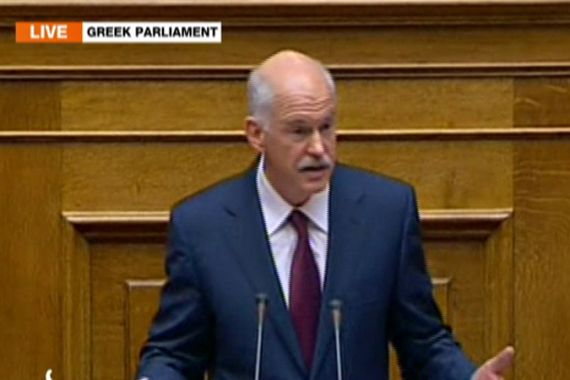Greek PM faces crucial vote of confidence
George Papandreou struggles to hold on to power as support wavers in his own party and opposition calls for him to quit.

| Al Jazeera’s Jonah Hull reports from Athens, Greece’s capital, on the growing political standoff |
George Papandreou, the Greek prime minister, faces a crucial confidence vote after being forced to back down from a proposed referendum on an EU bailout plan for the debt-crippled country that drew criticism from his own party.
Papandreou can count on the support of at most 151 deputies in the 300-seat parliament in Friday’s late-night vote but even if his Socialist government survives, the prime minister is likely to face renewed calls to step down and call early elections.
Al Jazeera’s Barnaby Phillips, reporting from Athens, said the prime minister was living on borrowed time. “It’s on tenterhooks. It will be close whether he succeeds or fails.
“There is an amazing paradox as well … There are a lot of people in the governing Socialist party who want George Papandreou to leave but who don’t feel that early national elections at this time of crisis would help Greece. So that hope may just keep George Papandreou in office beyond tonight,” Phillips added.
A senior Socialist deputy told The Associated Press on Friday he would not support the government unless Papandreou pledged to resign over the weekend and start talks on a caretaker government.
Andreas Loverdos, Greece’s health minister, writing on a political blog, also said it was “inconceivable” that the government should win the confidence vote and then pretend that nothing had happened.
| Jonah Hull reports on ground-level effects of Greece’s austerity crisis |
“Unless immediate steps are taken toward the formation of a national unity government, I will have no place in that political process,” said Loverdos.
Protesters opposed to the government’s austerity cuts gathered outside the parliament in Athens ahead of the vote.
“Some 3,000 demonstrators have come into Syntagma Square, or Constitution Square, and they are outside the parliament building which is protected by riot police. They are chanting ‘thieves! thieves!’ against the members of parliament,” our correspendent reported on Friday.
Antonis Samaras, a Greek opposition leader, urged Papandreou to quit during a parliamentary meeting on Thursday to vote on whether to accept the EU package that contains deeply unpopular spending cuts.
Papandreou said that calling early elections would be “catastrophic” and said Greece must implement the 130bn-euro ($179bn) EU bailout plan to avoid defaulting on its debts.
Much of Greece and many European leaders reacted with horror after Papandreou abruptly announced on Monday that he would put the rescue plan, agreed at a eurozone summit last week, to the Greek people.
But he told the cabinet on Thursday that he would drop plans for a nationwide referendum on the plan if the opposition joined him in a coalition.
Through waves of austerity policies demanded by the nation’s international lenders, Papandreou has carried the parliamentary group of his party with him, despite much criticism within the ranks, but defections have left him needing every vote to survive.
The Socialists have 152 deputies in the parliament, but one of them, Eva Kaili, has said that while she would stay in the party, she would refuse to support the government in the confidence vote, meaning Papandreou could count at most on 151 votes.
‘Lacks political legitimacy’
Yanis Varoufakis, an economics professor at the University of Athens, told Al Jazeera that “it is not inconceivable that Papandreou is going to win the vote of confidence”.
“Because his members of parliament have to decide between sacrificing their seats – because this is what will happen if the government falls, they will have to face the electorate – and vote in the manner which will allow them to walk around the streets of Athens in their own towns and villages with their heads held high,” he said.
“This government lacks political legitimacy, but then again politicians have been known to vote in a manner which promotes self-interest.
| In Depth | |||||||||
|
“But even if he wins the vote, he is a mortally wounded prime minister who does not even command the respect of his inner circle.”
Costas Panagopoulos, the head of ALCO pollsters, said: “The prime minister’s position is very difficult, since he chose not to respond to the opposition’s proposal for a transitional coalition government.
“Therefore I believe that it is unlikely that he will win the vote.”
Greeks have fought very fiercely against policies which have brought spending cuts, tax rises and job losses, pushing the nation into three years of recession.
Demonstrators have staged a series of strikes and protests, some of which turned violent.
This made a “no” vote in any referendum highly probable, even though this would cut off Greece’s last international financial lifeline and risk spreading its debt crisis to much bigger eurozone economies, such as Italy and Spain.
German Chancellor Angela Merkel and French President Nicolas Sarkozy summoned Papandreou to Cannes on Wednesday ahead of the G20 summit, where they made clear Greece would receive no EU aid if the nation failed to stick to the deal.
